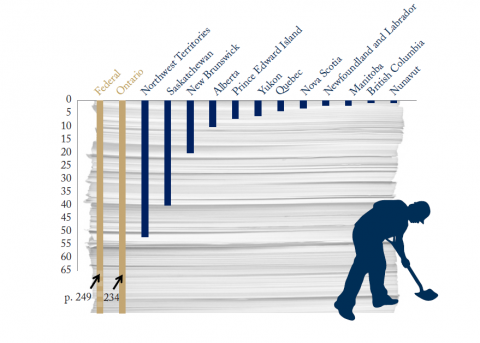From: William Robson, Colin Busby, and Farah Omran
To: Canada’s Finance Ministers
Date: May 24, 2017
Re: Show us the Numbers! Budgets Should Put Headline Revenue and Spending Up Front.
The spring budgets of federal, provincial and territorial governments are cornerstones of Canadian fiscal and economic policy. Budget votes are votes of confidence: essential to legislatures’ – and ultimately voters’ – control of public funds. Budgets are serious documents.
Or, at least, they should be. But not all are. Some governments’ budgets are businesslike and direct. Any numerate reader can open one, and quickly and confidently find the key projections for consolidated revenue and spending, and for the difference between them and its consequences for the government’s net debt. Others are padded with fluff. A reader has to dig through dozens – even hundreds – of spin-filled pages to get the critical information.
The 2017 budget round offers a stark contrast. British Columbia’s budget put the key numbers right up front: page 1. Serious. The federal budget buried them on page 251 – not even in the main document, but in an annex. Not serious.
A recent C.D. Howe Institute report on the fiscal accountability of Canada’s senior governments compares the accessibility, quality and reliability of their beginning-of-year budgets and end-of-year financial reports for 2016. Where jurisdictions locate their headline budget figures matters: are revenue and spending figures accessible immediately or are they buried or scattered among many pages, tables and footnotes?
In 2016, British Columbia and Nunavut presented their consolidated revenue and spending figures on page one. Manitoba, Newfoundland and Labrador, Nova Scotia, Quebec, Yukon, Prince Edward Island, and Alberta, all reported theirs in the first 10 pages of their budgets.
Joining Ottawa in the unserious category was Ontario – which also buries its headline revenue and spending figures hundreds of pages deep. Also unimpressive were the Northwest Territories and Saskatchewan, who presented their budgets’ readers with a gratuitous challenge.
Canadians need better financial reporting and fiscal management from their governments. An easy early step in that direction would be for the governments that force readers of their budgets to sort through a book-length text to find the key numbers. That’s not serious – and budgets are serious business.
Farah Omran is a Researcher, Colin Busby is an Associate Director of Research, and Bill Robson is the President and CEO of the C.D. Howe Institute.
To send a comment or leave feedback, email us at blog@cdhowe.org.






